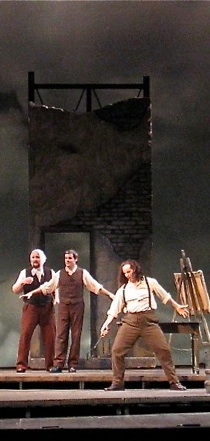La Boheme
Opera Theatre of St. Louis, 2001
Sarah Bryan Miller - St. Louis Dispatch
The skies threatened all day, but refrained from raining on Opera Theater of
St Louis’ 26th opening night Saturday; the weather was just about perfect for the traditional pre-opera
picnics and post-concert drinks.
Inside the Loretto-Hilton, a winning production of Giacomo Puccini’s
deservedly beloved La Boheme captivated the audience. Conductor Federico
Cortese and director Tim Ocel led a talented cast of youthful singers in a musically lovely and
dramatically inspired production of this universal favorite, last seen here in1978.
One of the company’s greatest strengths is its ability to cast youthful
singers who look their parts. This cast had more than its share of fine performers, from small parts to
large, and, for once, the boyish hijinks were entirely believable. The Rodolfo was areal find: tenor
Gerard Powers has good looks, ringing high notes and an affecting acting style.
His bohemian buddies—baritones Lester Lynch and Marcus DeLoach and
bass-baritone Kyle Ketelsen—were equally well cast. As Marcello, Lynch offered a big, rich voice; he
was occasionally a little stiff, but made up for it with his thoroughly likable presence. DeLoach, last
seen here two seasons ago in The Merchant and the Pauper made the most of
the relatively minor role of Schaunard both dramatically and vocally, while Ketelsen’s dark, gorgeous
voice and sardonic persona made Colline a standout.
Death from consumption is always a tricky one to pull off in opera, and
soprano Pamela Armstrong seemed overall a bit too healthy for Mimi. But her voice is beautiful and her
acting appealing; her moments with Rodolfo, in particular, were deeply affecting. Yali-Marie William,
as Musetta, had great attitude, fine timing and a terrific subito piano, hard to pull off on a high
note.
Bass-baritone Terry Hodges provided two very different comic characters in
the landlord, Benoit, and Musetta’s sugar daddy, Alcindoro, both nicely delineated. As the toy-seller
Parpignol, Christopher Wilburn sang with a clear tenor through the distractions of a busy streetful of
urchins. Cary John Franklin's chorus, both adult and children, sang their brief but complicated music
with accuracy and style. Diction was generally good. There was great news in the pit from conductor
Federico Cortese, who brought real understanding, style and feeling to the score. …
Producing opera is always a challenge in the thrust-stage, storage-impaired
Loretto-Hilton. Boheme, with its lyric realism, is particularly difficult,
but Erhard Rom found creative solutions to its problems, with set fragments that mixed and matched to
work in three very different scenes. It was a little unsettling to see the garret rearranged for Act
IV, and the large yellow moon that dominated in the first and second acts was just a bit too evocative
of Salome. Robert Perdziola's 1890’s-style costumes worked well;
Christopher Akerlind's lighting cast an appropriately gentle light on the scene.
Ocel’s direction was a delight. He drew beautifully nuanced performances
from his singers, and demonstrated an eye for the small detail and movements dictated by the music. He
made the Act II crowd scene come alive with plenty to see in all corners of the stage, and proved
himself much more than a traffic cop. …
Puccini’s bohemians are always welcome visitors; when Opera Theater can
present them in productions this well-conceived, the company should bring them back more frequently.
Photo: Marcus Doshi

Tim Mix / Derrek Taylor / Matthew Burns
La Boheme
Puccini
Boston Lyric Opera
2007

